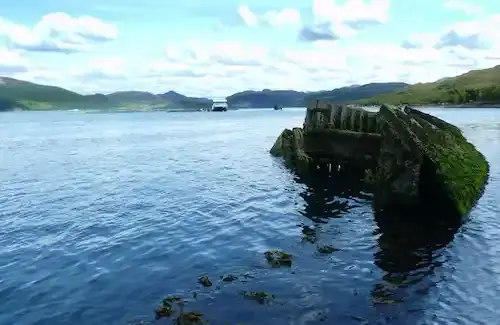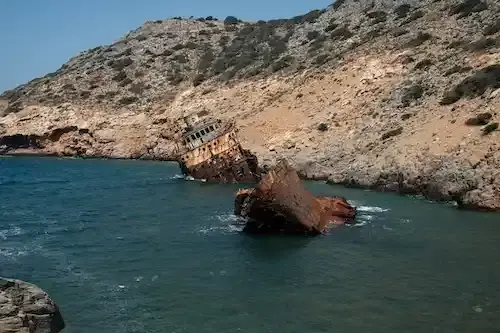Who finds something to keep? Uncover the secrets of sunken ships that have been rescued
Imagine the following situation: while walking along the beach, you come across a shipping container that the sea threw there full of good goods. You can hardly believe how lucky you are, and you start grabbing everything you can get.
Show key points
- Maritime salvage law determines the rights and responsibilities when rescuing goods at sea, emphasizing that finders aren't automatically owners.
- For a salvage claim to be valid, the property must be in danger, the rescuer must act voluntarily, and the rescue must be successful.
- Successful salvors are entitled to a reward from the property's owner, which can vary based on effort, skill, resources used, and the value of the rescued goods.
- ADVERTISEMENT
- Intent plays a crucial role in distinguishing legal salvage from theft, with factors like trying to contact the owner indicating lawful behavior.
- The maximum salvage reward cannot exceed the value of the rescued property, even in the most challenging and successful operations.
- Famous incidents, such as the MSC Napoli case in 2007, highlight how public misunderstanding of salvage law can quickly turn into large-scale illegal looting.
- Legal salvage requires transparency and good faith, while concealing found goods without attempting to return them is typically seen as theft.
But are these goods legally yours now?
That was the question that was asked when a shipping container on the shore of one of the islands was washed away by the waves. What disappointed many at the time was that it was empty. But the question remains: who can claim maritime ownership of things that end up on our shores?
It turns out it's not as simple as saying: he who finds something keeps it.

Let us review salvage law, by which we mean the process of ridding a ship or cargo of cargo from danger at sea.
Recommend
Simply put, we can say that it is a service by a volunteer in order to save the survivable property from loss or damage.
A rescuer's successful rescue operation gives him the right to receive a financial reward from the owner of the rescued property.
Naval lawyer John Kavanagh says that when it comes to rescue, there are a few concepts to consider:
They have to be in danger: there must be some danger to marine property, otherwise there will be no rescue from this danger.
You have to be a volunteer: Your performance of the rescue operation may not be caused by you performing any kind of duties or requirements that oblige you to perform this performance. In this way, we exclude crew members who rescue their own ship, as well as members of the police and other emergency services whose tasks include rescuing property.
You have to succeed: Rescue services have historically been provided according to the rule that "no healing, no reward." "Healing" in this context means that part of the ship or cargo has actually been saved, while "remuneration" relates to the value of the property that has been cleared.
"If you take all these concepts into account, and you can recover and redeem the property, then you can go to the landlord and say, 'Your property is in my possession, and if you pay me the rescue bonus, I will give it back to you,'" says Cavanagh.
I have salvaged some marine property, what is my reward?

The value of the reward changes depending on the value of what was saved, as well as how hard you put into that rescue.
But the maximum of that bonus is the value of the property itself.
"There are quite a few things to consider, such as the degree of one's skills, the value of the investment that the rescuer put into the process, time, effort, fuel, ships, people, and so on," says Cavanagh.
"There's also the degree of success of the operation. You may actually save what you want, but you've done a lot of damage in doing it."
And certainly the value of the original thing itself must also be taken into account.
"If there's a $10 million ship, it's in unimaginable danger, you have to practice a great deal of skills and use a lot of resources to save it, and you end up to complete success in your endeavor, then you can claim up to 100 percent of the value of the property.
What is the difference between salvage and theft?

This completely depends on your intentions.
"There are always two elements to any criminal offence. The first is the mental element, and the second is the material element."
"The physical element is the process of taking, that is, when the goods come out of the container and hold them. The fundamental difference between theft and rescue is intent."
"So if your intention is to salvage, even if you take the goods and take care of them, but then you call the owner and say, 'I salvaged your goods,' it means you have no intention of permanently depriving the owner of those goods."
According to Kavanagh, trying to contact the owner here was "evidence of intent."
"The intention in anyone's head is invisible... But if you have evidence, that you reached out to the owner, made inquiries, found him and called him to tell him that you got his goods and he can get them back if he pays the cost of the salvage, it is very clear that you have the intention to save. But if you return it to your home and keep it and don't tell anyone about it ... Most people will think you have no intention but to keep it to yourself.
Are there any famous stories about rescue?

One of the most famous examples is the tale of the MSC Napoli.
The MSC Naples is stranded off the south coast of England. In 2007, this cargo ship was intentionally docked ashore off the south coast of England to prevent it from crashing during storms. Some 100 containers fell and were swept away by the waves to the so-called Jurassic coast, a United Nations-registered World Heritage Site.
ABC reported at the time: "Locals were initially fascinated by the event, then rejoiced and descended ashore, followed by excrement pickers from all over the country, and everyone spent two days and two nights frantically looting whatever booty they could get their hands on."
"Very quickly, motorcycles, car parts, clothes, makeup, diapers and even biblical books translated into foreign languages were stolen, all stolen by loafers on the beaches baring their fangs in a crazy hunt for spoils similar to what happened in the days of sailing ships and pirates."
Mr. Kavanagh says it was "an extraordinary event by any standard."
"All these absolutely wonderful things fell on the beach. And what can we say about that... It's a very thin line when the only difference between theft and rescue is intention.








